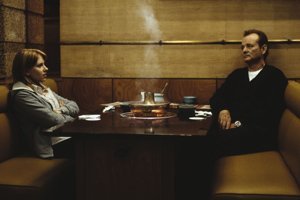Lost in Translation
Everyone wants to be found.

|
Lost in Translation is a film about connection. Bob Harris (Bill Murray) and Charlotte (Scarlett Johansson) are two lost souls, one an ageing washed out actor and the other a young, intelligent yet self critical college graduate, who despite their age and cultural differences, connect in a country and a life in which they both feel out of place. They’re lost not only literally in a Japanese culture, equal parts beautifully overwhelming and laughably alien, but emotionally in their respective lives, unsure of their place in the world and the point of it all.
As they start to explore their feelings and surroundings they reach out for each other desperate to find understanding, comfort or even just escape. Neither wants to return to all the problems and emptiness of their dissatisfying lives, and whilst this beautiful slightly insane culture is an entertaining short term escape for them both, the film teaches us a simple lesson: escapism is never a solution. This film is full to the brim of beauty and serenity, emotion and the amazing wry wit for which Bill Murray has become so universally adored. For any seeking a shred of beauty in an otherwise ambivalent world, for any who just feel lost in their lives or even for any who just want to experience this film’s immense and evocative soundtrack, Lost In Translation is a must.
Andrew Kersley
Coming away from its small-scale Oscar triumph and the critical adoration heaped upon it by the press, it is perhaps high time to consider exactly what it is about Lost In Translation that so captivated audiences and intellectuals alike – after all, it is just an extended version of “Before Sunrise” in the Far East, isn’t it?
Well, in fact, no it isn’t – for one thing, Lost In Translation is not a romance in any airport paperback sense of the term. Rather, it’s a delicately drawn portrait of two very different people who have somehow managed to lose themselves in their own lives, cast adrift in Japan and lonely in a way it is only possible to be in a throbbing, endlessly crowded metropolis. Blessedly these two lost souls meet and form a bond which is as transitory as it is powerful, and begin to discover together both the incredible country in which they find themselves, and the emotions that make them human.
Lost In Translation, while following a fairly conventional narrative coding, doesn’t offer easy answers and trite resolutions, but instead relies on pitch perfect performances and deceptively intricate direction to convey a sense of both alienation and affirmation, and as such there are three people who deserve credit. Bill Murray, playing Bill Murray perfectly, brings the perfect sardonic edge to his portrayal of a past-his-prime actor who is just doing his thang for fortune and glory, while Scarlett Johannsonn is divine as the young wife ignored by her photographer husband. But the true kudos must go to the waif-like Miss Coppola, who has crafted a film of such melancholy beauty that it makes the heart ache. From her charming vistas of Mount Fuji to the fragmented editing which conveys the loneliness of her characters so perfectly, she nary puts a foot wrong – something one could barely say about her father post- Godfather Part II.
So what is it about Lost In Translation that just works so well? I suspect it’s the fact that it is a film that never condescends to the viewer, never indulging in crass sentimentality or easy answers to complex questions. And, in dealing with the most widespread and painful of human emotions, it cannot but strike a chord with even the most automaton-like of viewers. As a filmic experience, Lost In Translation is moving: as a piece of art, it is astounding.
Greg Taylor
More Information | Back to Previous Schedule | This Season | BBFC Classification Guidelines
Screenings of this film:
| 2003/2004 Summer Term – (35mm) |
| 2003/2004 Summer Term – (35mm) |
| 2017/2018 Spring Term – (35mm) |


